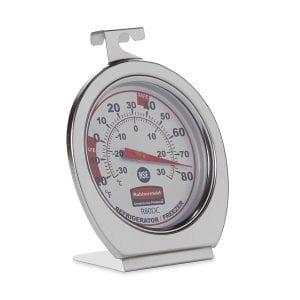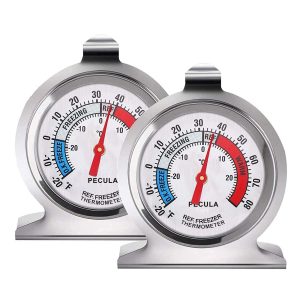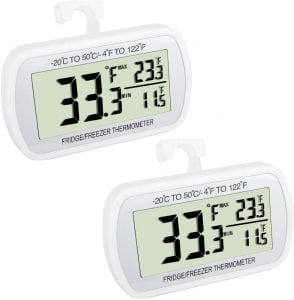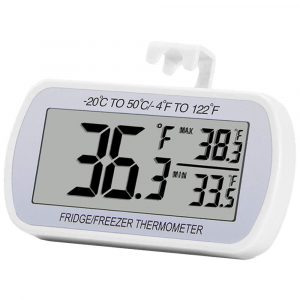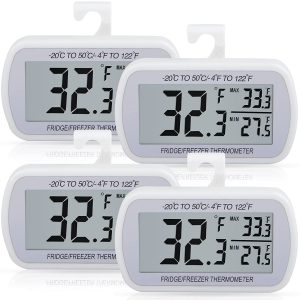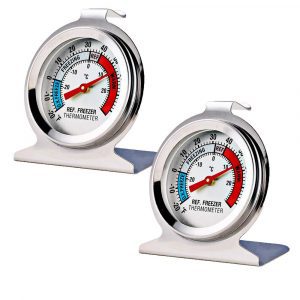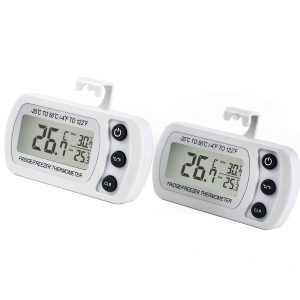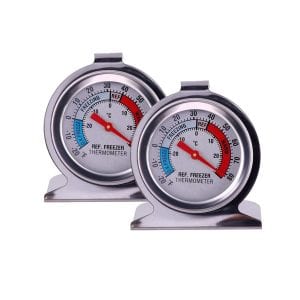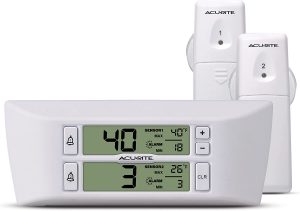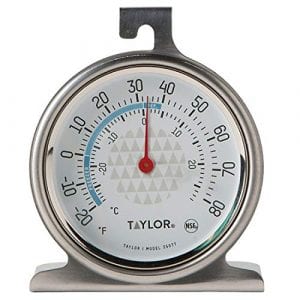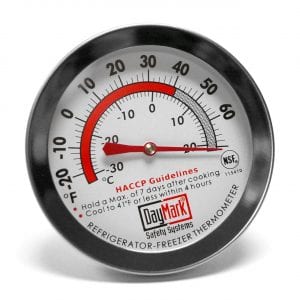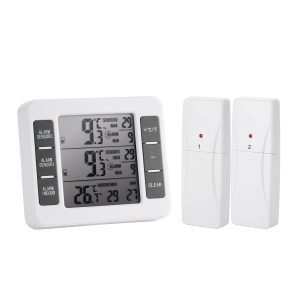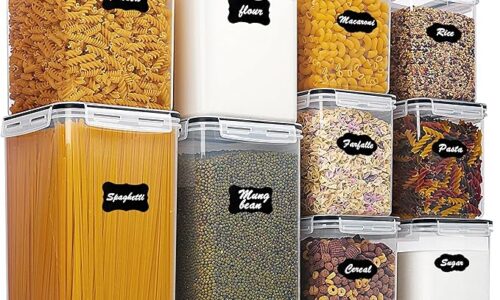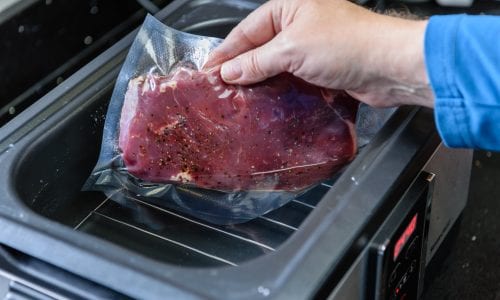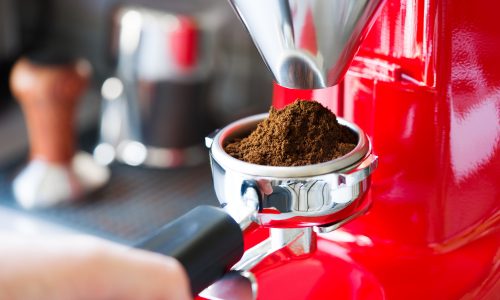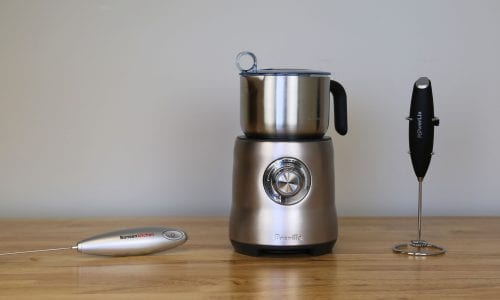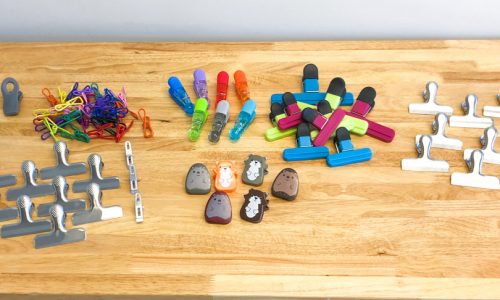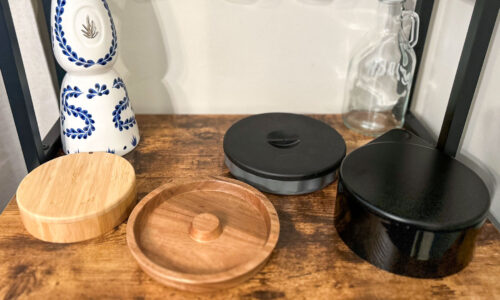The Best Refrigerator Thermometer
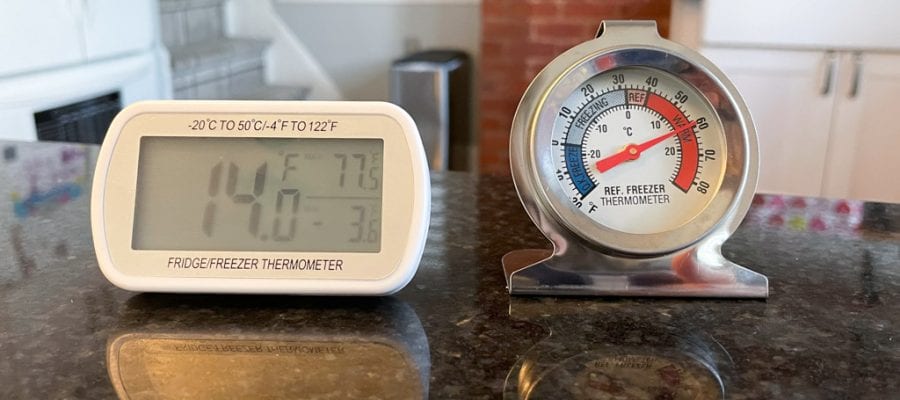
Our Review Process
Don't Waste Your Money is focused on helping you make the best purchasing decision. Our team of experts spends hundreds of hours analyzing, testing, and researching products so you don't have to. Learn more.
Our Picks For The Top Refrigerator Thermometers
- 1. Rubbermaid Commercial Waterproof Chrome Refrigerator Thermometer
- 2. PECULA Easy Read Stainless Refrigerator Thermometers, 2-Pack
- 3. VOULOIR Portable Electric Refrigerator Thermometers, 2-Pack
- 4. RIY Easy Read Hooked Refrigerator Thermometer
- 5. AEVETE Battery Powered Hanging Refrigerator Thermometers, 4-Pack
- 6. LinkDm Stainless Steel Refrigerator Thermometers, 2-Pack
- 7. Unigear Battery Powered Refrigerator Thermometers, 2-Pack
- 8. JSDOIN Easy Read Refrigerator Thermometers, 2-Pack
- 9. AcuRite 00986 Battery Powered Wireless Refrigerator Thermometer
- 10. Taylor 3507 TruTemp Classic Refrigerator Thermometer
- 11. DayMark NSF-Listed Dial Refrigerator Thermometer
- 12. Esnow LCD Screen Alarm Refrigerator Thermometer
This refrigerator thermometer helps keep foods fresh and safe by instantly displaying an accurate temperature reading. Battery-free and made using stainless steel with a shatterproof lens, this thermometer is built to last.
Top-Notch Food SafetyThis refrigerator thermometer is handy and reliable.
This refrigerator thermometer works well in both refrigerators and freezers. It's made from a durable stainless steel and can handle a temperature range between -20 and 80 degrees Fahrenheit. The large dial also features a red indicator, so you are quickly alerted when the temperature becomes too warm.
Economical PickAffordable is the best word to describe this budget-friendly refrigerator thermometer two-pack.
Thanks to the large digital screen on this refrigerator thermometer, you'll be able to determine the temperature in your fridge at a quick glance. The thermometer also offers two methods of installation. You can use the magnet in the back of the unit or the built-in upper hook.
Waterproof DesignThis refrigerator thermometer is easy to operate with just a power button, reset button and a Celsius/Fahrenheit button.
Use this refrigerator thermometer in your fridge, freezer or anywhere you need to keep track of the temperature. It's accurate to within 2 degrees and features a large digital display. Users will also appreciate that the thermometer is waterproof, which means you can even use the device to check your baby's bath water.
Most VersatileWith this refrigerator thermometer, you have the choice to hang it up, stand it upright or attach it to a metal surface using the back magnet.
Buying Guide
If someone were to ask how cold you keep your refrigerator or freezer, would you know how to answer? Most people might have an idea of the setting on the dial (typically somewhere between one and seven), but what does that really mean? And perhaps more importantly, what temperature should your fridge and freezer be set to?
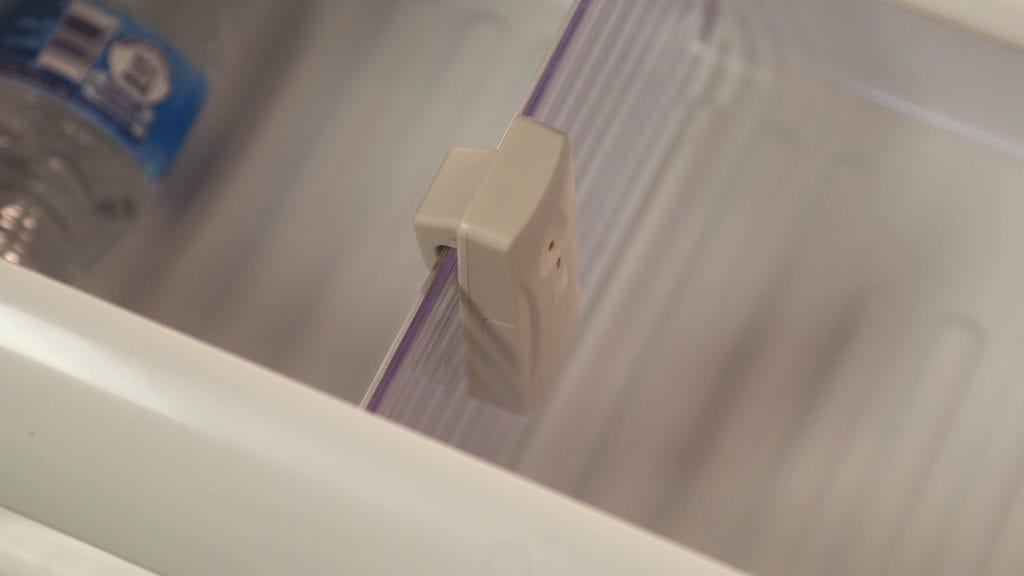
When food reaches room temperature, illness-causing bacteria can double every 20 minutes. One of the safest and easiest ways to slow the growth of these harmful organisms is to chill foods to the proper temperature.
Placing a thermometer in your refrigerator is an effective way to keep your family safer, as you can verify that foods are being kept at a safe temperature, especially since most fridges only have a numeric dial that does not show actual temperatures. A refrigerator or freezer thermometer can even save money on your utility bills. Knowing what to look for will help you make the best selection for your circumstances.
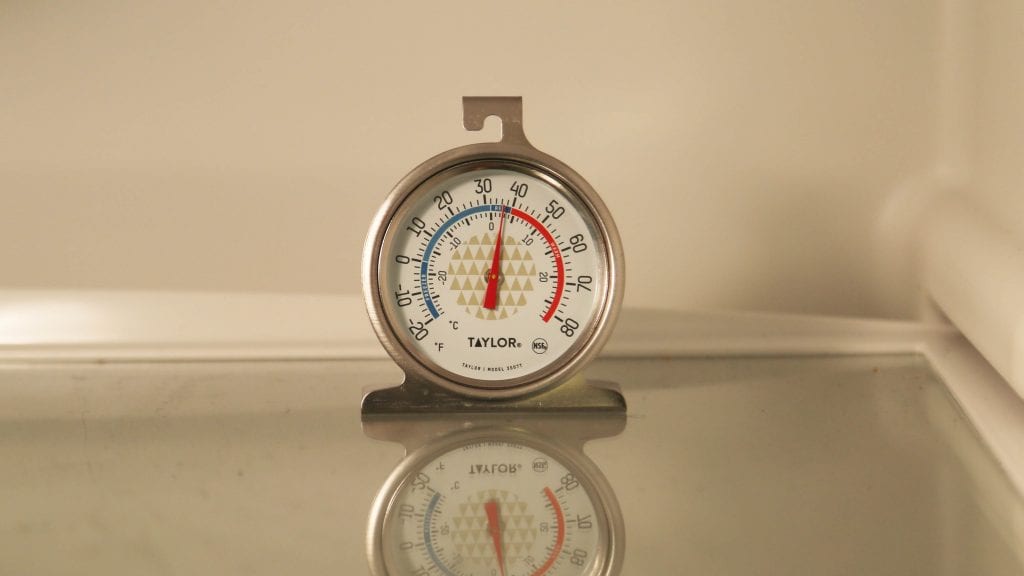
“If you are setting the dial in your fridge and hoping the arbitrary number you’ve chosen is cold enough, you should be using a refrigerator thermometer,” recommends Vicki Liston, the writer, producer and host of award-winning home improvement and DIY show, “On The Fly…DIY,” which helps consumers with their DIY projects. “This useful little device ensures you are storing your food at a safe temperature — under 40 degrees Fahrenheit or 4 degrees Celsius, to be exact — to avoid spoiling as well as inhibiting dangerous mold and bacteria growth.”
Not only that, but certain thermometers can help in emergency situations.
“A refrigerator thermometer will come in especially handy after a power outage,” Liston explains. “Did the temperature get too high and all of your food needs to be thrown away? Or was it close, but hadn’t gotten to a harmful level yet? You’ll know with absolute certainty whether or not the food is safe to eat, which could save you hundreds of dollars in groceries in the long run.”
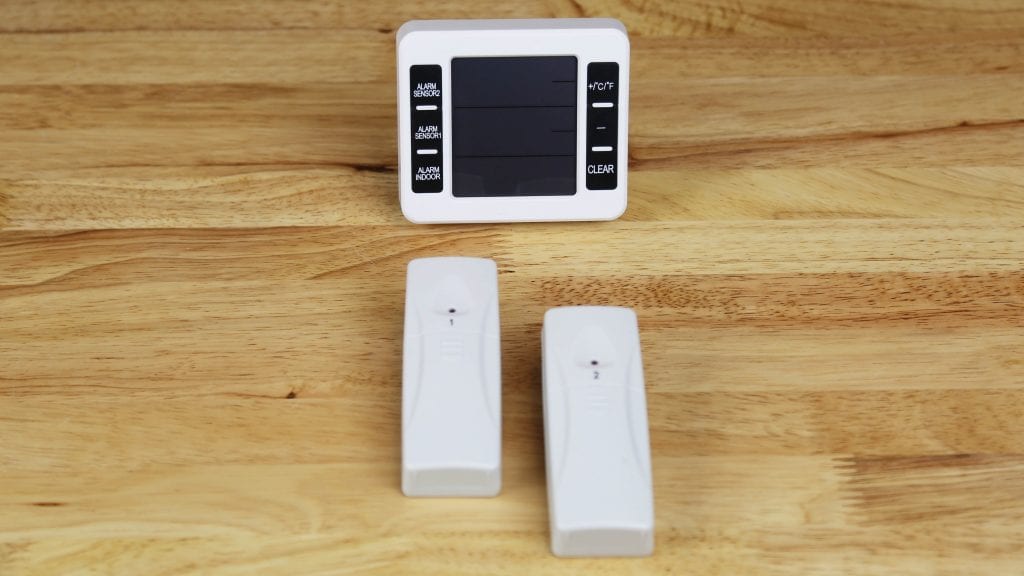
Another way an accurate refrigerator thermometer could help you save money is by cutting your energy consumption.
“If your fridge is set to maintain a temperature of 33 degrees, but 37 degrees is still well within limits, you can up the temperature and save the electricity it takes to maintain the lower-than-needed level,” Liston says.
Our Expert Consultant

Home Improvement Expert
Vicki Liston writes, produces, and narrates “On The Fly…DIY,” an award-winning home improvement and DIY show of unique project tutorials for the casual DIY’er.
Home improvement and all things DIY have been Liston’s passion since she bought her first house in 2007 and she started making video blogs in 2014. She’s performed hundreds of DIY projects, from small ones to major, wall-smashing renovations and can teach you how to make a trendy DIY barn door for cheap. The proceeds earned from “On The Fly…DIY” are donated to no-kill animal shelters and rescue organizations.
What to Look For
- Liston suggests looking for a thermometer that gives you multiple ways of attaching to your refrigerator. “A hook, stand and magnet will all give you the flexibility to place the thermometer exactly where it needs to go, which is in the dead center of your fridge, for the most accurate reading,” she says. “Placing it too close to the back will give you a colder-than-actual reading while too close to the front will read the warm air that rushes in every time you open the door.”
- Consider a higher-end model if you want to be able to check the fridge or freezer temp quickly and easily. These thermometers come in two or even three parts: a sensor that you can place in the middle of the fridge (and perhaps a second one for the freezer) as well as a separate display or dial that you mount on the outside. You don’t even need to open the door to get a temperature reading with these models.
- “Opt for a refrigerator thermometer that specifically notes waterproof as a feature,” advises Liston. “You might think this is a given, but you don’t want one spill to ruin the unit’s functionality.”
- “Choose one with an easy-to-read dial or large display so you can read the temperature with a glance,” Liston suggests. “Holding the door open longer while trying to read the dial increases the amount of warm air entering the fridge and counterintuitive for having a thermometer in the first place. Anti-fog is another notable feature to look for as it will also make the numbers or dial that much easier to read.”
- Refrigerate foods promptly, whether you are bringing them home from the grocery store or storing leftovers. All food should be put in the fridge within two hours to prevent harmful bacteria from multiplying.
- The average refrigerator consumes approximately 10% of the total electricity used in a common household. Your refrigerator will run most efficiently if it is somewhat full. An empty fridge actually requires more power to maintain cool temps.
More to Explore
Refrigerators started becoming a common household item in the United States around 1920. By 1956, 80% of American homes housed refrigerators. Currently, at least 15% of U.S. households have two or more refrigerators.
Early refrigerators required ice to keep food and beverages chilled (hence the nickname “icebox”). However, the ice did not come from a squeaky-clean factory initially. In the 1850s, ice was harvested from frozen lakes. If you could afford the best ice, it still likely had some algae in it. The cheaper stuff was filled with leaves, dirt and other unsavory “ingredients.” Consumers who purchased ice harvested in industrial areas often received blocks contaminated by factory pollution and sewage.

